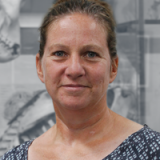My research interests lie in early modern environmental history, with a focus on histories of water and flooding. I am engaged in several projects related to these research interests – on early modern flooding; internal drainage boards; and environment and emotion – for further information see link below.
Rich Crane
Rich’s key research and teaching areas are extractive metallurgy, materials science, nanotechnology and applied geochemistry for a range of applications including the development of novel mining techniques, mine site reclamation, waste treatment, water treatment and contaminant transport.
More information on Rich’s institutional profile
lora fleming
Lora is the director of the Centre for Environment and Human Health and chair of oceans and human health at the University of Exeter Medical School. She is a board certified occupational and environmental health physician and epidemiologist with over 30 years of experience and expertise in environment and occupational exposures and human health research and training.
Joanie Willett
Joanie is interested in the complex inter-relationship between identity, the economy, and the environment and exploring sustainable communities through theory, practice, policy and governance.
clare saunders
Clare researches social movements, protest and environmental politics. Her work has been particularly focused on environmental and global justice movements, although she has recently been engaged in a pan-European study of protest on a range of issues. Her current work looks at pro-environmental behaviour change – looking especially at energy use and clothing – and climate change policy networks.
ilya maclean
Ilya is an applied ecologist interested in climate-vegetation interactions at the scales relevant to management and decision-making. He has expertise in microclimatology, remote-sensing and fine-scale hydrological modelling.
Emma Mckinley
Emma’s research covers marine social sciences, public perceptions of marine and coastal systems, social and cultural values and their role in marine and coastal governance, marine planning, blue growth and coastal communities.
Hannah pitt
Hannah’s research focuses on the community use of blue-greenspaces, their benefits and what prevents people accessing them; current project work with Canal and River Trust.
Jon Anderson
Jon’s research focuses on water worlds and surfing places; geography, place & culture; including literary geographies.
Sarah Perkins
Sarah’s research examines the role of individuals in disease persistence and invasion; social networks and infectious disease dynamics; citizen science and the use of AI to track disease.
Shailen Nandy
Shailen’s research has focused on aspects of international development, and on poverty analysis and anti-poverty strategies including the problem of multiple malnutrition in young children in West and Central Africa. Interested in social policy and its role in national development strategies in the era of the Sustainable Development Goals.
Wouter Poortinga
An environmental psychologist, based in the Welsh School of Architecture and the School of Psychology. Expertise in psychological and behavioural aspects of single-use plastics. Other research interests are in human-environment interactions, including:
environmental risk perception
sustainable behaviours and lifestyles
Roy Maconachie
Roy’s research in Sub-Saharan Africa explores the social, political and economic aspects of food production and natural resource management, and their relationships to wider societal change.
Nick McCullen
Nick is interested in how the complex interactions between the various components, such as buildings, technology, the environment, and people, result in the energy consumption of the built environment.
Linda Newnes
Linda’s research focuses on whole life value analysis (monetary, environmental and societal costs) from concept design through to the in-service/in-use phases.
Joe Devine
Joe’s research focuses on poverty, inequality, vulnerability, and South Asia.
Dave Gordon
Dave holds the posts of Professor of Social Justice, Director of the Bristol Poverty Institute and Director of the Townsend Centre for International Poverty Research at the University of Bristol. He provides research leadership for multidisciplinary poverty relevant research and advised the World Health Organisation on measurement issues concerning water and sanitation access and policy in low and middle income countries.
Philip Cooper
Philip studies the interface between accounting and the environmental impacts of economic activity (how non-financial reporting at the corporate level can be optimised to support decision-making, including through the use of values derived from environmental economic techniques). Philip extends perspectives on the accounting entity and environmental impacts, considering aggregates such as economic sectors and countries (a recent pan-European, cross-disciplinary EC Framework VI project on the marine environment, and the role of the accountant in achieving sustainable development).
Lucy O’Shea
Lucy’s research is in the area of waste management. Her disciplinary background is economics, so she is interested in how regulation can incentivise pro-environmental behaviour. She is also interested in the effects of regulation, e.g. how different measures interact with each other, as well as, their effects on industry.
Julie Barnett
Julie works within social science and focuses on human behaviour and communication. Julie’s research concerns early warning systems and people’s judgment/ understanding of risk, and upstream/up pipe thinking. Julie is interested in designing new technologies that account for human acceptabilities.
Adrian Healy
A UKRI Future Research Fellow, Adrian’s research focuses on the resilience of people and places, urban groundwater and water resilience in sub-Saharan Africa.
Julian Padget
Julian’s research focuses on multiagent systems; agent-based simulation; sensor architectures; IoT; energy and air quality monitoring; distributed ledgers; fusing symbolic and statistical AI; policy modelling; security and privacy.
Ian Bateman
Ian is an environmental economist, interested in ensuring sustainable wellbeing through the integration of natural and social science knowledge within decision making and policy. Particular interests lie in the fields of quantitative analysis, integrated modelling and the valuation of non-market benefits and costs.




















